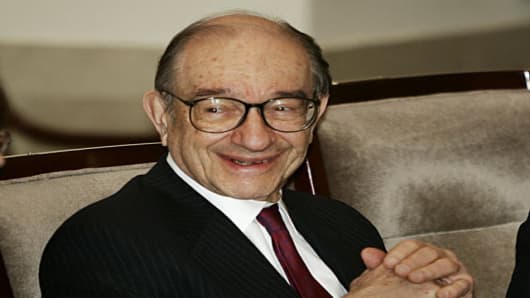Alan Greenspan, once the world's top central banker, said on Friday ongoing credit turmoil
reminded him of the 1987 and 1998 market crises as data showed U.S. firms cut 4,000 jobs last month, the first fall in four years.
"What we are observing in the last seven weeks is identical in many respects to what we saw in 1998, what we saw in the stock market crash of 1987," the Wall Street Journal quoted the former U.S. Federal Reserve Chairman as saying.
Hedge fund Long-Term Capital Management controlled $100 billion of assets in 1998 but collapsed in the wake of a Russian debt crisis, wreaking havoc in many derivatives markets. Greenspan took over as Fed chief shortly before the Dow Jones Industrial Average slumped 23% in a day in October 1987.
The bleak U.S. jobs report confounded forecasts that hiring would keep rising and covered a period before the worst of the credit turmoil began to bite. Many financial services firms hit
by mortgage debt problems have recently announced layoffs.
Force Fed Cut
Analysts said the figures, which also revised down estimates for hiring in June and July, must force the Fed to cut interest rates at its Sept. 18 meeting or even before, a move analysts
say is vital to take the edge off market upheaval.
"(A rate cut) seems in the bag, and frankly I wouldn't be surprised if it were sooner than the 18th, and I wouldn't be surprised if it were 50 basis points," said Michael Metz, Chief
Investment Strategist at Oppenheimer.
Forecasts for interest rates have altered dramatically since the credit crisis, stemming from mass defaults on U.S. subprime mortgages lent mainly to poor people, prompted banks to clam up on lending as they strive to calculate exposure to the sector.
The European Central Bank, Bank of England and their equivalents in Australia and Canada all left rates on hold this week. Until recently, they had all been expected to tighten
policy sooner rather than later.
ECB President Jean-Claude Trichet said on Friday his bank was still poised to act on inflation risks, but the mood of uncertainty meant no change in rates was imminent.
"Given this high level of uncertainty, it is appropriate to gather additional information and to examine new data before drawing further conclusions for monetary policy," Trichet said
in a speech to academics and analysts.
World Growth Slowing
International Monetary Fund Managing Director Rodrigo Rato said he expected a downward revision of world growth estimates for 2007 and 2008 as a result of the subprime crisis.
"The downward revisions are likely to be largest for the United States but we may also see some impact in the euro area and Japan," he told an economic conference in Italy.
Central banks have poured money into money markets over the past month to tame sky-high rates with limited success, although they showed patchy signs of easing on Friday.
London interbank offered rates for the euro fixed below the ECB's benchmark interest rate of 4 percent for the first time since Aug. 28. But three-month sterling Libor rates hit 6.8875
percent, their highest since November 1998.
"We suspect money market pressure will be slow to fade and the impact on the real economy will be more notable than expected," Morgan Stanley said. "The question is, where are the
surprises?"
Other news of subprime damage kept investors on edge.
The U.S. commercial paper market shrunk 13 percent in the past month as U.S. companies struggle to raise short-term capital, while U.S. homes going into foreclosure hit a record in
the second quarter, data showed on Thursday.
Lehman Brothers Holdings Inc said it would fire another 850 workers or about 3 percent of its workforce as it scales back mortgage lending operations globally.
And various estimates showed corporate financing markets under strain, with some $300-$500 billion of commercial paper due to be rolled over before the Fed meeting.


